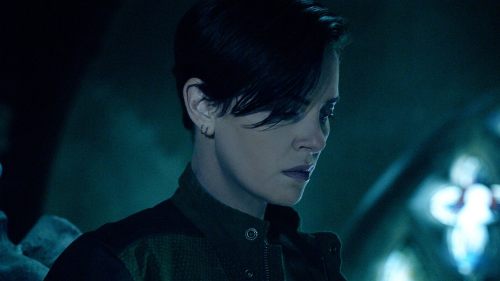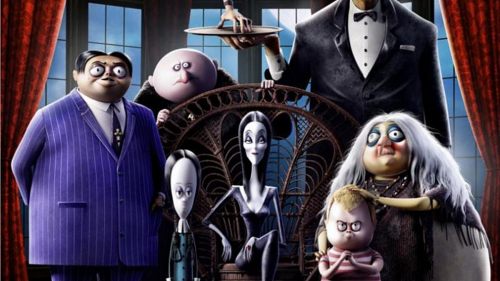SXSW Review: LONG SHOT Is A Fun-Filled Love Story With A Feminist Slant
Historically, I possess a certain aversion towards the rom-com genre, usually gravitating towards those that push the envelope, defy societal expectations of what love should look like, and support marginalized groups. As a whole, the genre tends to be one-dimensional and avoids embracing diversity or deeper thematic messages. However, director Jonathan Levine’s latest film, Long Shot, is a refreshing addition into a personally tiresome genre which made me laugh repeatedly, cheer, and even swoon by dissolving the grievances I usually have with romantic comedies.
Writers Liz Hannah (The Post) and Dan Sterling (Girls) compose a script that enhances their talents by spotlighting dated gender roles and misconceptions within romantic relationships through representation, wit, and raunchy humor. Even their fraudulent world of politics is an apt metaphor for how the political climate can parallel romance. Charlize Theron and Seth Rogen star with adorably palpable chemistry by tackling normally depressing and defeating societal and political commentaries with an authentic and sweet love story.
The film follows Fred Flarsky (Rogen), a fervent journalist with a strong moral code who’s written articles for a Brooklyn newspaper with titles like “Why The Two-Party System Can Suck A Dick.” The first shot consists of him infiltrating a white supremacy group for a story and narrowly escaping once he is exposed. Upon returning to work, he discovers his paper has been bought out by a giant multi-billion dollar media conglomerate, which he doesn’t want any part of. From the beginning, it’s cemented that Rogen’s character is unlike any we’ve seen in the past. He has a good job but chooses to leave because the company no longer aligns with his morals. He also maintains a sense of integrity that, for the most part, keeps him on a trajectory where his heart is in the right place with the best intentions despite some foolishly impulsive decisions along the way. It’s this kind of rectitude that is at the sturdy core of Long Shot and branches out through the characters’ actions, intentions, and decisions. Down and out, Flarsky’s charismatic best friend (O’Shea Jackson Jr., Ingrid Goes West) takes him out for a night of partying to cheer him up. At a swanky event, he encounters the Secretary of State, Charlotte Field (Theron), even more dreamy and glamorous than the days when she would babysit him in their youth. The two reconnect and Field decides to hire Flarsky to write her campaign speeches promoting her new environmental initiative in efforts to run for the presidency in 2020. Reluctant at first, Fred eventually agrees because he can’t resist the opportunity to save the world by her side.
What sets Long Shot apart is the authenticity of the characters. Fred doesn’t take the job just to sleep with his lifelong crush. Even his writing methods originate from a sincere place by utilizing Field’s personality and passion for the environment to promote her best interests for the American people (and ultimately the world). As a result, he suggests spending more time with her in order to get to know her better. It’s just an added bonus that he also gets to hang out with the woman he has a huge crush on and admires. There’s no deception involved and no manipulative motive, which is a narrative approach that I absolutely love. Furthermore, Fred is able to let Charlotte shine. He sits back at fancy galas and doesn’t try to steal her spotlight nor does he try to sabotage her dream of becoming president just so he can sleep with her or have a relationship with her on his terms. There’s this sense of admiration, equality, and ability to put his pride and insecurities on the backburner. He finds sweet and subtle ways to show his support and feelings for her while trying to conceal their romance as to not jeopardize her work, which makes their alone time all the more charming and meaningful whether they’re slow dancing to Boyz II Men, hooking up, or rolling on Molly at a nightclub.
This film will most likely be polarizing for various reasons whether that be the feminist slant or the political backdrop. However, it attempts to work as a way to bring further awareness to the gender bias women face not just in politics, but in the workplace and in romantic relationships viewed through the judgemental lens of societal expectations as well. Most people know this to be true already, but there’s still a lot of denial and sexism about these topics. June Diane Raphael (Grace and Frankie) plays Fields’ Chief of Staff and brings a hilarious amount of sass to the film that really hits the nail on the head with these statements. She frequently reminds Field that her image is of utmost importance while propelling the notion that women have to work ten times as hard to be respected or deemed worthy of their positions of power. This ranges from the men she dates to the clothes she wears and the food she eats. Hell, even the wave of her arm to say “hello” isn’t good enough.
There’s also sex-positive elements that further support Field and Flarsky’s endearing relationship. In one hook-up scene, Field discloses a specific sex position she wants him to do and even choke her a little bit. She then quickly apologizes stating she’s his boss and she’s now being bossy in bed too. Flarsky calms her concern and states he was just surprised at her request, but it’s entirely fine by him. This is a short scene, but it’s still meaningful because of the sexual stigma that women face whether that be slut shaming, openly communicating about their own desired pleasures, or enjoying kink. It’s gratifying to witness a sex-positive encounter where the man doesn’t get offended and angry just because a woman is vocal about what she wants in bed. Another refreshing element is that Field is older than Flarsky (hence the babysitter role in their youth). Flarsky never once uses her age against her, and the writers don’t resort to cheap jokes about her being an older woman. While some may get hung-up on the babysitter male fantasy trope, the difference here is that it isn’t shot through a typical male gaze. A young Flarsky helps Field make signs to run for class president and tells her she’s amazing after she recites her goal to increase the school’s recycling efforts. The camera doesn’t frame on her bending over, her legs in a short dress, or a close-up on her body in any way. This further supports the authentic and respectful adoration between these two characters. Yes, there are dick jokes at times and self-deprecating humor primarily from Flarsky, but the film doesn’t heavily rely on them to get laughs.
Another unconventional plot point is that the characters don’t hurt one another in the standard sense. There’s no exposed lie or deliberately hurtful argument that causes tension. Moreso, it’s the political climate and society’s judgment that inhibits their relationship to be publicly acknowledged. While the film does a lot for representation in terms of casting, political affiliation (Flarsky’s best friend is “down with G-O-D and the G-O-P”), and sexism, there are still blind spots that do adhere to conventional rom-com formulas. There are some moments that come off as mansplaining; there’s still the undesirable male who’s secretly loveable and can get the successful, beautiful girl at the end of the day; and the focus is still primarily on the male lead’s journey as “Flarsky” was the film’s title originally. Long Shot is not perfect and entirely adhering to its feminist message, but it’s a substantially funny execution that still subverts several stereotypes. Women having it all, men being comfortable and supportive in a relationship with a woman who is more successful than they are, and women receiving the proper respect they deserve in positions of power are all long shots. It’s just nice to see a film attempt to make all of these concepts seem possible, even if it is just in a movie - for now, at least.



